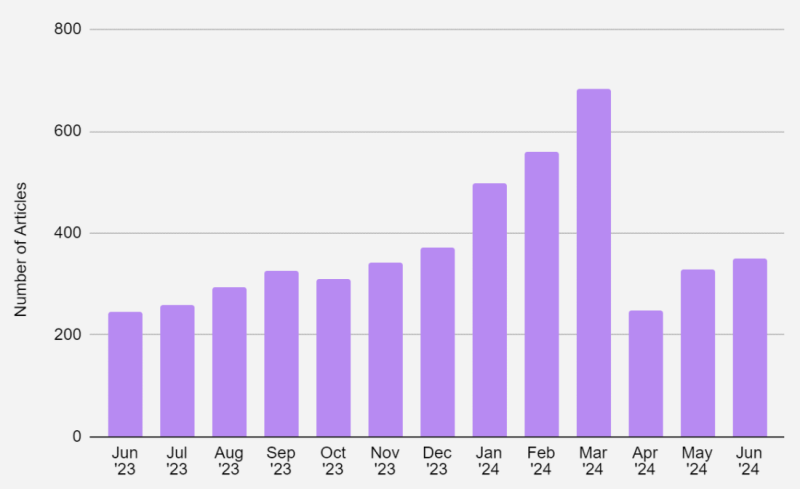Introduction
In this edition of Bridgehead Social Care's monthly news round-up we examine the adult social care sector's news coverage over the past month.
Between 1 and 30 June, references to 'adult social care' appeared in 350 unique media articles across the UK, a figure more than six per cent higher than May's coverage statistics, which stood at 329 articles.
For context, the chart below plots mentions of adult social care on a month-by-month basis over the past 12 months.

Coverage in June focused on several key recurring themes concerning the problems relating to local authorities struggling to maintain financial stability whilst coping with increasing demand for services, including adult social care. However, there was also a spike in coverage relating to election pledges made by various parties namely a rise in coverage around a National Care Service and free personal care.
Building on from that, a central focus of news outlets, including Sky News, The Guardian, The Independent and BBC News, focused on the Liberal Democrats' proposals for social care outlined in this election. The leading policy they've committed to is a free personal care model, similar to the existing system in Scotland, something that the Green Party have also pledged in their manifesto. The party also outlined plans to spend an extra £3.7bn a year on social care, including a higher minimum wage for care workers of at least £2 above the national minimum wage to help tackle vacancies. Given the roughly 152,000 vacancies in the sector, improving poor pay is clearly needed to bridge the workforce gap.
Another area that the Liberal Democrats have sought to prioritise are the millions of unpaid carers across the country. They've pledge to deliver a £20 per week increase to the Carer's Allowance, which supports people looking after someone with an illness or disability for at least 35 hours a week, as well as raising how much carers can earn in addition to caring duties to a minimum £183 a week and still receive the allowance. Given the difficulties faced by carers, made clear by the recent scandal of fines being issued for irregularities with the Carer's Allowance, this is a welcome political development towards making social care a real priority for government. The main parties, Conservatives and Labour, have remained mostly silent on the issue during the campaign. However, the centrality of the issue to the Liberal Democrats' platform is a sign that the future may yet bring closer attention to the sector's challenges.
The Guardian reported on the crisis of pay for social care workers, finding that almost half were paid less than the real living wage.
According to The Evening Standard, the Conservatives have retained their pledge to introduced the delayed cap on social care costs, originally slated for Autumn 2023 but industry experts were concerned by the lack of attention to care in the manifesto.
Meanwhile, Community Care has published the recent findings by the Local Government Association that local authorities will face a multi-billion pound 'black hole' in their finances due to rising social care costs, which the next Government will have to address.
In other news, The Guardian reported on Deputy Leader of the Labour Party, Angela Rayner, claiming its health and social care plans would save money. This comes following criticism that the party is ignoring the vast funding gap that will exist for the sector after the election.
2. BBC News - Lib Dems pledge free personal care for adults
The Liberal Democrats pledge to provide free personal care at home for older and disabled people, funded by reversing tax cuts for big banks. Leader Sir Ed Davey says this, along with raising care workers' pay, will ease the hospital crisis and help people stay in their homes. The policy includes a carer's minimum wage and a Royal College of Care Workers. Currently, only those with assets under £23,250 receive care cost help in England. The Lib Dem plan, similar to Scotland’s system, would cover nursing and daily support costs but not residential care accommodation.
3. The Guardian - Nearly half of England’s care workers get less than real living wage, study finds
Nearly half of care workers in England earn less than a real living wage, according to the IPPR. Their research shows 43 per cent earn under £12 an hour, with 80 per cent in London earning less than £13.15. In Scotland and Wales, care workers earn at least the real living wage. Campaigners, including Citizens UK, argue low wages lead to high turnover, poor care quality, and low morale. They urge the next government to ensure all care workers are paid the real living wage. The IPPR estimates this would cost £415 million, with a net cost of £330 million after tax revenues.
4. Community Care - Mounting social care costs leave councils facing £6.2bn black hole over next two years, warns LGA
The Local Government Association (LGA) warns that English councils will face a £6.2bn funding gap for social care over the next two years. The LGA urges political parties to commit to increased funding in the next spending review, including £5.4bn more for adult social care this year. They recommend multi-year funding settlements, investment in preventative services, and higher care worker pay to tackle recruitment issues. No specific social care funding commitments have been made by Labour or the Conservatives.
5. Evening Standard - Tories re-state pledge to bring in delayed social care costs cap
The Conservative manifesto promises to cap social care costs from late 2025, a reform delayed from 2023. The plan includes a multi-year funding settlement for local authorities, workforce retention, and support for unpaid carers but lacks new funding details. Mike Padgham of the Independent Care Group and Caroline Abrahams of Age UK are sceptical due to past delays and unclear funding. The Nuffield Trust also doubts the feasibility given current financial constraints. Care England and the National Care Forum welcomed the commitments but criticised the lack of specifics and detailed plans. Social care remains minimally addressed in the manifesto.
6. The Guardian - Labour’s NHS and social care plans will save money, says Angela Rayner
Labour’s NHS and social care plans will save money, according to Angela Rayner, despite criticisms from thinktanks that their funding plans fall short. The Health Foundation warns of a potential £38bn annual shortfall needed to improve the NHS by the end of the next parliament. The incoming government faces tough choices: increasing taxes, reducing other spending, or scaling back NHS services. Labour's manifesto, while aiming for a national care service, has been criticised for not being ambitious enough.



